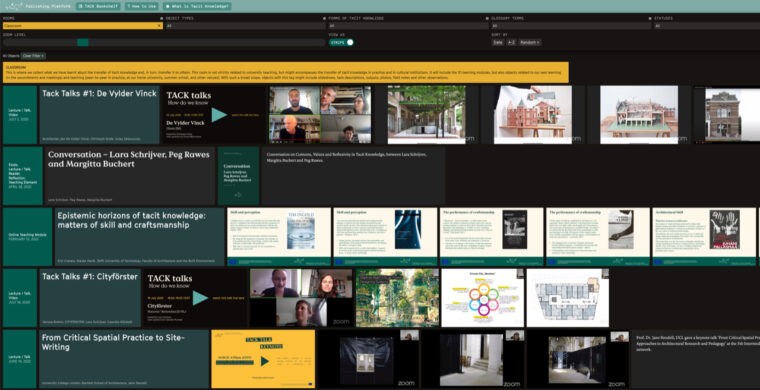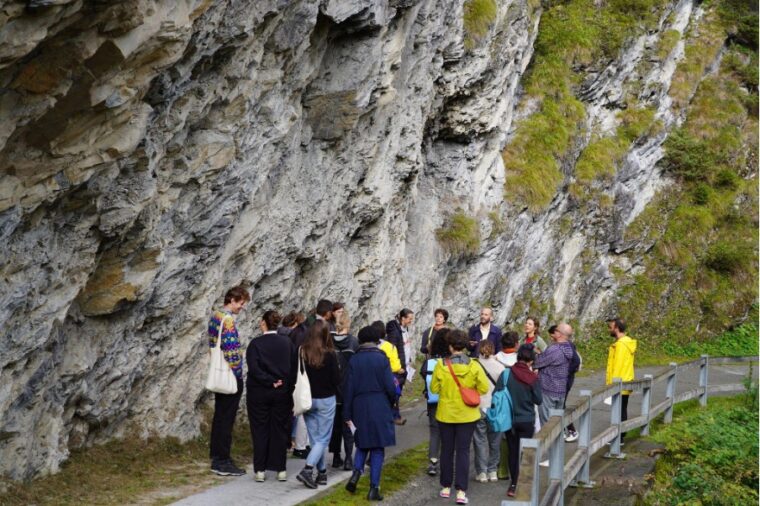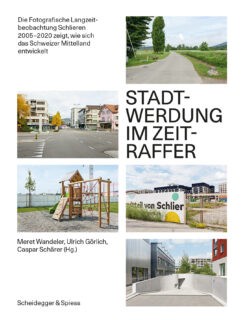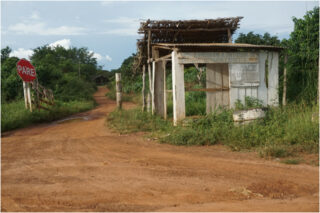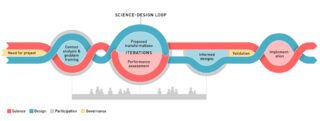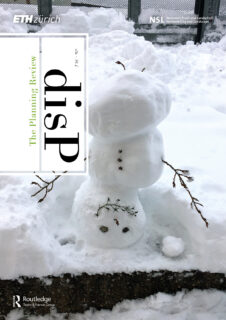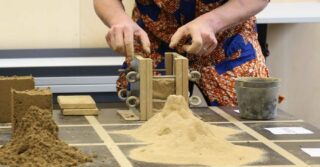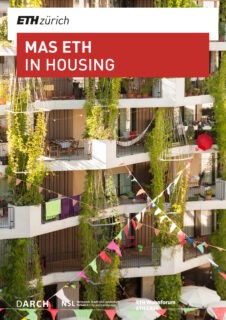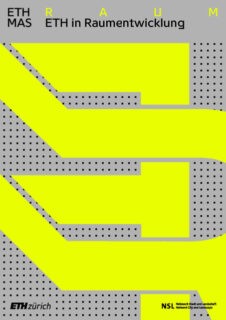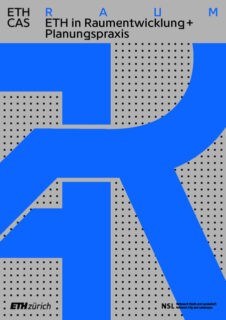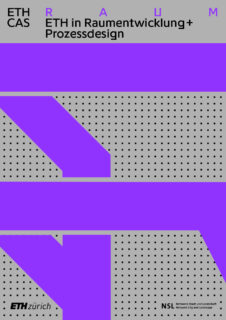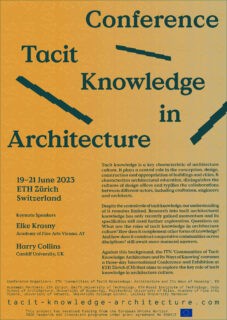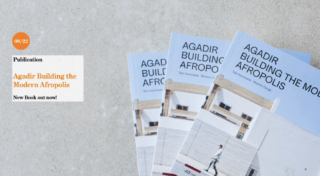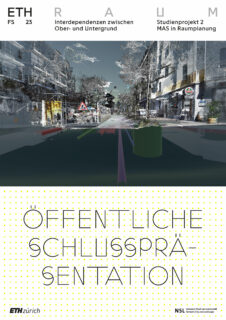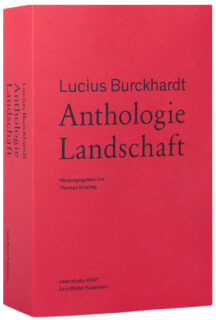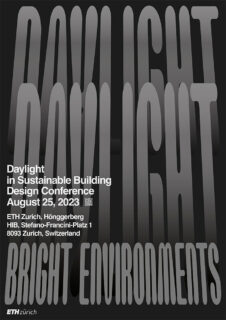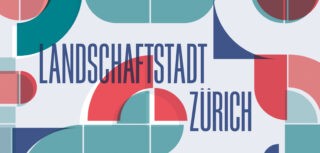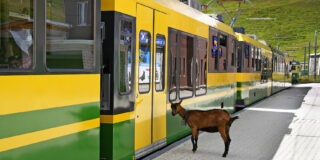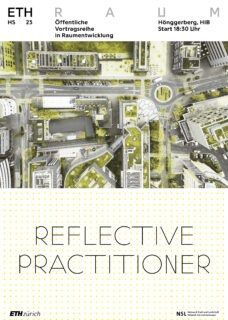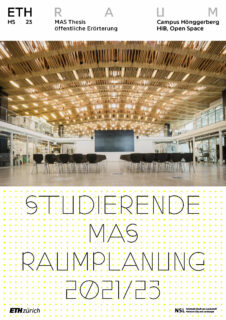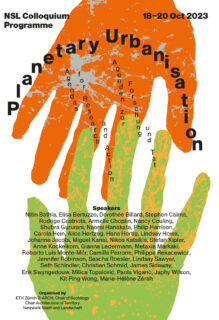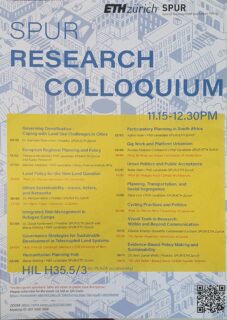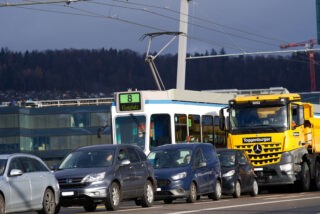Sehr geehrte Lesende
Wieviel und welches Wissen wird in der Architektur «unausgesprochen» gelehrt? Wissen wird auch während des Forschungsprozesses in Zusammenarbeit er- und vermittelt oder von Schweizer Studienteilnehmenden (wissentlich) übers Smartphone hergegeben.
Wir hoffen, Sie wussten das noch nicht alles und wünschen viel informatives Lesevergnügen.
Sustainable Construction | Hygrothermal Specialisation starts in September 2023, application until 31 July 2023.
It is time to go beyond sustainability. Alternative solutions out of local resources such as earth, bio-based, and reused materials are emerging all over the world and are triggering regenerative output.
Continua
ETH Wohnforum – ETH CASE | Application until 30 June 2023 (2nd round).
The MAS focuses on the assessment of housing challenges and on the affordability, effectiveness and sustainability of a wide range of housing and neighbourhood development strategies pursued by municipalities, cooperatives, local governments, non-governmental and governmental authorities and international organisations in different countries and contexts.
Continua
ETH RAUM | Bewerbung bis 30. Juni 2023 (2. Runde).
Der MAS in Raumentwicklung befasst sich mit der Gestaltung und der Nutzung unseres Lebensraums und den sich darin abspielenden gesellschaftlichen, politischen, ökonomischen und ökologischen Prozessen.
Continua
ETH RAUM | Bewerbung bis 30. Juni 2023 (2. Runde).
Das CAS in Raumentwicklung und Planungspraxis behandelt die aktuellen und zukünftigen Herausforderungen der Raumentwicklung sowie zielführende Methoden und Verfahren für eine innovative Planungspraxis. Der Studiengang ist als Denklabor für raumrelevantes Handeln und Entscheiden konzipiert.
Continua
ETH RAUM | Bewerbung bis 1. Dezember 2023.
Das CAS in Raumentwicklung und Prozessdesign vermittelt Expertise und innovative Formate der Prozessgestaltung. Dabei steht der Mensch im Zentrum: Eine designorientierte Haltung, agile Vorgehensweisen und kollaborative Methoden bilden die Grundlage, um räumliche Veränderungsprozesse anzugehen.
Continua
Conference and exhibition «Unausgesprochenes Wissen / Unspoken Knowledge / Le (savoir) non-dit».
19-21 June 2023 | ETH Hönggerberg, Stefano-Franscini Platz 5, Zürich
Tacit knowledge is a key characteristic of architecture culture.
Continua
NEW: anytime after 25 June | Musée de la Reconstruction d’Agadir, Morocco, and online.
Continua
30. Juni 2023, ab 14:00 Uhr | Zollhaus, Zollstrasse 121, 8005 Zürich.
Raumplanerische Interdependenzen zwischen Ober- und Untergrund. Strategien für eine vertikal-integrierte Raumentwicklung. Veranstaltungswebseite
Continua
13. Juli 2023, 18:00 Uhr | Vernissage | case studio VOGT, Stampfenbachstr. 59, 8006 Zürich.
Anmeldung erwünscht, bis am 3. Juli 2023 an event@vogt-la.ch.
In seiner Anthologie Landschaft geht der Soziologe Lucius Burckhardt (1925-2003) von einem problematisierten Landschaftsbegriff aus. Er fragt: Warum sehen wir die Umwelt als Landschaft und unter welchen Umständen?
Continua
25 August 2023, 8:30-18:00 | Conference | ETH Zürich, HIB 52 Open Space, Hönggerberg.
Continua
Ausstellung 09.06.2023 bis 24.09.2023 // Mittwoch bis Sonntag 14:00 – 18:00 Uhr | Zentrum Architektur Zürich (ZAZ), Höschgasse 3, Zürich.
Continua
5 September | ETH Zürich, Hönggerberg, HIT E 51.
Continua
6–8 September | ETH Zürich, Hönggerberg, HIT E 51, Wolfgang-Pauli-Strasse 27.
Continua
10.1.24; 7.2.24, jeweils 18:30 | Öffentliche Vorlesungsreihe | ETH Zürich, Hönggerberg, HIB Open Space 1 + 2.
Continua
4.-6. Oktober, ab 09:00 Uhr | ETH Zürich, Hönggerberg, HIB Open Space 1+2.
Die MAS Studierenden präsentieren nach zweijährigem Weiterbildungsstudium ihre Masterarbeiten. Continua
18, 19, 20 October 2023, colloquium and exhibition.
The conference debates themes including patterns and processes of urbanisation in agricultural territories, processes of extractivism, and the role of infrastructure, movements of people, goods and resources, and the state space in relation to urbanisation. It also addresses new conceptual instruments that scholars of planetary urbanisation have been developing and reflect on emerging design approaches related to territories of extended urbanisation.
Continua
9 January – 20 November 2023 | ETH Zürich, Hönggerberg, HIL H 35.3 or HIL H 40.4 and online.
Continua
4. März–26. November | Ausstellung im Museum Burghalde Lenzburg.
Continua
6. bis 8. December 2023 | ETH Zürich, Centre and Hönggerberg.
Video Links of the 7th December
Photographs and presentations of all three days
About
This colloquium brings together transport planning researchers and practitioners to reflect on the growth processes of western or industrialized societies by identifying, assessing, and operating their transport infrastructures.
Transport planning as a discipline and practice has supported the growth processes of western or industrialized societies by identifying, assessing, and operating their transport infrastructures. In the last 150 years it was able to solve the capacity problems arising from population and industrial growth by using some of the growing national incomes to build more or better infrastructures for the growing number of vehicles. The challenges and the time frame of the greenhouse gas (GHG) accumulation change the way our societies should respond both in terms of our speed and in terms of the scale of our actions.
This colloquium brings together transport planning researchers and practitioners to reflect on these issues. The range of issues and suggestions can help to formulate strategies strong enough to fulfill the commitments which our societies have entered.
Day 1 brings together former students and researchers of the Institute for Transport Planning and Systems (IVT). Younger academics will present on day 2, while more senior researchers and practitioners will conclude on day 3. They will reflect on their ongoing work and on their experiences. They will draw their conclusions for our policy making and planning. The open discussions during and at the close of the colloquium will help defining our agendas for the future.
Speakers
Kay Axhausen, ETH Zürich; Milos Balac, ETH Zürich; Oded Cats, TU Delft; Francesco Ciari, Polytechnique Montreal; Richard Emmerink, Schiphol Airport; Alex Erath, FHNW Muttenz; Martin Fellendorf, TU Graz; Pieter J. Fourie, Dr. sc. ETH, FCL Singapore; Daniel Hörcher, Imperial College London; S. Hörl, System X, Paris; P. M. Jones, UCL London; Matthias Kowald, FH Rhein-Main, Wiesbaden; Allister Loder, TU München; Tanvi Maheshwari, Monash University Melbourne; Arnab Majumdar, Imperial College London; Rolf Moeckel, TU München; Kai Nagel, TU Berlin; O. A. Nielsen, DTU Lyngby; Robert Schlich, SBB; Yoram Shiftan, Technion Haifa; Lijun Sun, McGill University Montreal; Martin Tschopp, ARE
Redaktionsteam
Silvia Converso, Institut für Landschaft und Urbane Studien (LUS), Landschaftsarchitektur
Claudia Gebert, Koordinationsstelle NSL, Chefredaktion
Klearjos Papanicolaou, Institut für Landschaft und Urbane Studien (LUS), Städtebau
Maarten Van Strien, Institut für Raum- und Landschaftsentwicklung (IRL)
Jan Westerheide, Institut für Landschaft und Urbane Studien (LUS), Städtebau
Caroline Winkler, Institut für Verkehrsplanung und Transportsysteme (IVT)
